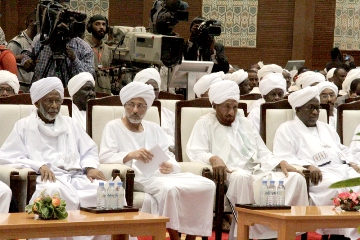Sudan opposition say national dialogue process seeks to achieve real change
August 22, 2014 (KHARTOUM) – The Sudanese Popular Congress Party (PCP) led by Hassan al-Turabi and the Reform Now Party (RNP) led by Ghazi Salah al-Din al-Attabani defended the national dialogue initiative launched by president Omer Hassan al-Bashir saying it seeks to achieve real change and peaceful transfer of power.

The National Umma Party (NUP) led by al-Sadiq al-Mahdi and the RNP suspended their participation in the national dialogue before the latter rejoined the process.
The opposition alliance of the National Consensus Forces (NCF) and the rebel alliance of the Sudan Revolutionary Front (SRF) refused to join the dialogue from the outset.
On August 8, the NUP and SRF signed the “Paris Declaration” which calls for ending the wars and engaging in a genuine national dialogue aimed at restoring democracy in Sudan.
The PCP political secretary, Kamal Omer Abdel-Salam, said on a talk show broadcasted by the state-run Radio Omdurman on Friday that the national dialogue committee wants to move the country from unilateralism to collective rule through implementation of the six issues of the dialogue.
The political parties participating in the national dialogue formed a committee, known as 7+7, comprised of equal numbers of government parties and opposition ones and chaired by president Bashir to lead the dialogue process.
He said the six issues include unity and peace, economy, freedoms, national identity, foreign relations and governance besides implementation of the dialogue’s outcome, stressing that he is confident that these issues represent a real Sudanese will that would educate politicians on both the government and the opposition sides on the meaning of true nationalism.
“We seek to achieve change that does not exclude anyone or a specific party but change which means peaceful transfer in everything as Allah said in the Quran (And these days [of varying conditions] We alternate among the people)”, he added
Abdel-Salam stressed that issues of peaceful transition of power, fair sharing of wealth, and removal of causes of war and injustices are all included in the roadmap, adding that they want to turn them into a reality.
The RNP deputy chairman, Hassan Rizq, for his part, said the roadmap has met many of the opposition’s demands, pointing they will present it to those who refused to participate in the dialogue inside Sudan and abroad.
He underscored that success of the dialogue is contingent upon accommodating all Sudanese people, stressing the need to even include the small groups in order not to allow them to resort to foreign powers.
Observers expressed fears that the national dialogue process aims to reunite the ruling National Congress Party (NCP) and to assemble traditional political forces supporting the adoption of an Islamic constitution in Sudan.
Truabi diverged since 1999 with Bashir on the attributions of regional governments and the inclusion of traditional parties in a large government supporting the establishment of the Islamic state in Sudan.
The RNP split from the NCP in 2013 over calls for reforms, transparency and democratic changes.
(ST)
